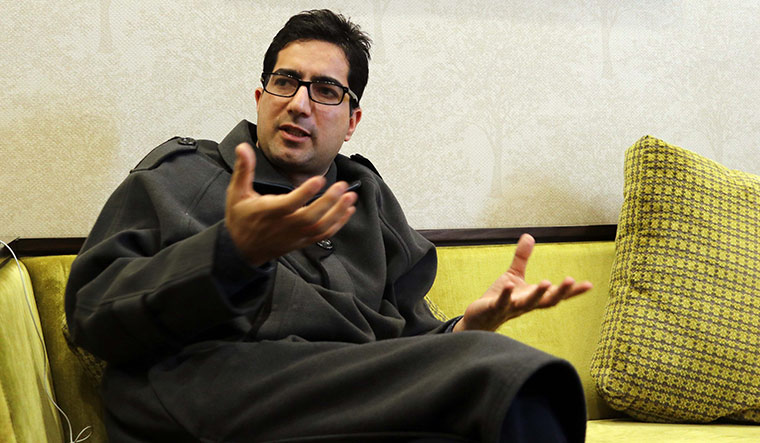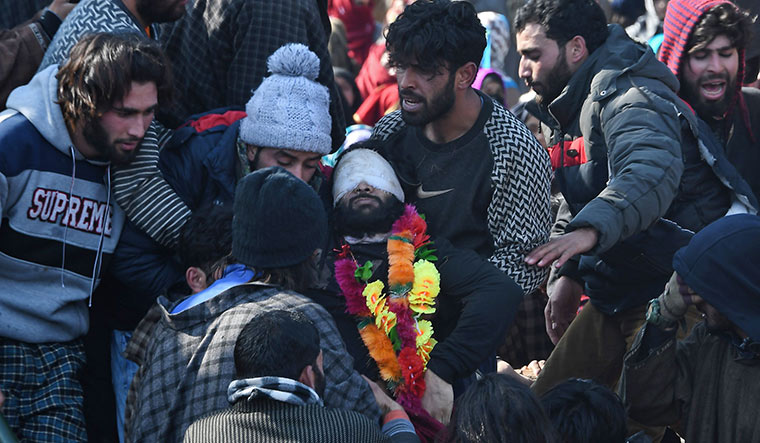Shah Faesal has had an eventful week. On January 9, the 35-year-old quit the Indian Administrative Service, barely ten years after he became the first Kashmiri to top the civil services examination. “I have decided to resign from IAS. Kashmiri lives matter,” he tweeted.
His Facebook post was more explanatory. He said the reasons behind his decision were “the unabated killings in Kashmir, and the lack of any sincere reach-out from the Union government”, along with “the marginalisation of around 200 million Indian Muslims at the hands of hindutva forces” and “the growing culture of intolerance and hate in mainland India in the name of hyper-nationalism”.
Faesal’s announcement evoked strong reactions across the country. Congress leader and former Union home minister P. Chidambaram called it an indictment of the BJP government at the Centre. “The world will take note of Faesal’s cry of anguish and defiance,” he said. Omar Abdullah, vice president of the opposition National Conference, described Faesal’s resignation as bureaucracy’s loss and politics’ gain. Mehbooba Mufti, former chief minister and president of the Peoples Democratic Party, said his decision should be “respected”.
Faesal has been staying at a hotel in Srinagar’s high-security Badami Bagh, welcoming visitors from places as far off as Baninal in Jammu. He told THE WEEK that his stint at Harvard, where he went on a Fulbright Scholarship last year, greatly influenced his decision to quit his job and take the political plunge.
“At Harvard, I learnt about putting in new ideas through disruption,” he said. “We saw disruption in technology and even in public transport.” He cited the example of how Uber and Ola changed the cabs segment. “Politics also needs new ideas,” he said. “My idea is to challenge the existing notions through disruption, and then try to create a new vision.”
Hailing from the Lolab area of Kupwara, Faesal considers himself a child of the Kashmir conflict. His father was gunned down by militants in 2002. “That affected me a lot and we had to shift from Kupwara,” he said. “We lost our education, place and friends.”
A trained medical doctor, Faesal admits that he does not have a quick cure for the Kashmir issue. “People who have seen nothing but betrayals for the past 70 years cannot be expected to trust someone easily. In fact, I am totally against putting blind faith in individuals,” he said.
In an extensive interview with THE WEEK, he talked about his vision for Kashmir and how he plans to win the people’s trust. “I won’t ask you to trust me at once,” he said. “I have given up a lot to be here. And, at this moment, I am not even claiming that I did it for you. I want you to give me six months and then judge me. Just six months. Will you?”
Excerpts from the interview:
Why did you leave the civil services for politics?
In conflict zones, the very nature of politics gets bureaucratised. Bureaucrats enjoy a lot of power because of political instability. But, the fact is that power does not belong to them. Bureaucracies try to appropriate power and fill the political space. That is basically the problem here.
In your first news conference after quitting your job, you said the military runs the politics in Kashmir.
What I meant to say was that we are dealing with a political crisis. People are dying. Youngsters are taking to guns. There is an open rebellion against the state. A part of the problem is being addressed by the military operation. When it comes to civic problems, the politicians are told that this is not your job. [They are asked to] focus on building roads, bridges and buildings. That is the fundamental issue here. The military is dealing with the political problem and the politicians are dealing with municipal issues.
The governor has said that you should come back.
I did not quit the job because I was not getting good postings. There is nothing wrong in the service that would have possibly compelled me to leave the job. The reasons were completely exogenous. I see a huge political challenge, and I wanted to contribute and be part of the political space.
You wrote in an article that pro-India politicians are not true representatives of the people.
What I meant is that people who are in electoral politics don’t earn their mandate on the basis of the sentiment. They should be very honest about it. They should not make loose statements about realities on which they have not actually sought a mandate. That space belongs to the Hurriyat Conference. The mainstream should acknowledge and respect that.
You say politicians do not have power. As a politician, how are you going to effect a change?
We want to take back that power, which belongs to us.
How would you go about it when the power structure remains the same?
I don’t think that power has been snatched. It has been given away. We are a special state. We have a unique constitutional status. We could have been self-sufficient when it comes to maintaining things we have. The problem is that we have given away something because we have delegitimised the political space. We win elections because just 1 per cent vote for us. We are not accountable to the people. And the people also think that [politicians] are there to just fill the space.
You are going to be part of the same political setup.
I am part of the same political space, not of the same political setup. I have made it clear that I may not be joining any mainstream political party.
You may end up as Irom Sharmila did. She entered politics after long years of struggle and then ended up as a nobody. Are you mindful of that possibility?
I am fully mindful of that. I will join electoral politics only if my ideas find resonance on the ground. I am not desperate to get a public office. I am ready to struggle for many years and convince people.
For how long you have been planning to resign?
For about two years. This struggle has been going on in my mind, that I need to leave the job. Some things have been happening. I have been reading and writing, questioning and trying to find some meaning about what is happening around me.
What was the tipping point?
The tipping point was (journalist) Shujaat Bukhari’s assassination. It shocked me. He was a very close friend. He was somebody we looked up to. That assassination changed the fundamental meaning of life for me.
Do you fear for your life?
I do at times, because I am operating in a space that belongs to nobody. I do not know the actors operating in a conflict zone. I understand it is risky.
How did your stint at Harvard shape your decision?
Harvard gave me an opportunity to detach myself from the reality here. I met people there who had abandoned big things in their lives. That gave me the courage to leave my job.
Are you amazed at the public reaction to your resignation?
It absolutely amazed me. I had thought that there were people joining one party or the other every other day. It is a shocking experience that thousands of people were outraged [at] me joining the existing political system.
Do you think you lost some respect because of your decision?
No. People thought I was joining the existing political setup. The anger was more about [whether] Shah Faesal was endorsing the status quo.
But what is wrong in joining the existing setup, which works for political goals like autonomy and self-rule?
I am also surprised that the youngsters who connect with me feel alienated.
They feel the existing setup has failed to deliver solutions. This is a new lesson for me, too.
But the youth does not even vote. How can they decide your future?
I have been trying to talk to this constituency. It is important for them to come forward and participate in the process.
You are entering mainstream politics at a time when it stands discredited in Kashmir. It reinforces the suspicion: What is Shah Faesal up to?
Absolutely correct. People have seen betrayals in the past so many years; the suspicion is very natural. But there are also a lot of cries for change. The younger generation is worried that people who have absolutely no sense of governance will be ruling us for the next six years. I totally respect the apprehension that people have.
You said Pakistan Prime Minister Imran Khan and Delhi Chief Minister Arvind Kejriwal are your inspirations.
They built successful public movements over a very long time. I am open to doing that and trying to work with people for many years before I can say I deserve to be given a chance.
So you will not be joining the NC or the PDP, or any other party?
Unlikely.
Is it because of the backlash you got on social media?
I have to be conscious of the feedback from the ground.
So would you strive on your own?
I am considering fighting independently. But that would depend on what are the odds of winning an election.
Will you float a party?
At this moment, I am not thinking of floating a party. A lot of people are approaching me, [saying] we should launch a party, but I do not want to divide the mandate at the moment.
Do you want to work towards solving the Kashmir conflict within the ambit of the Constitution?
Absolutely not. I am not even talking about solutions. I am talking about the processes that can finally lead to a situation where a solution can be discussed.
What do those processes entail?
One process will be about how we can enlarge the political space for all people.
People will then accuse you of converting more people to pro-India politics?
That is not so. I am saying whatever solutions you are talking about, let they [the people] be there. We are talking about the processes.
Have you made up your mind that the solution has to be within the bounds of the Constitution?
I am not somebody who would prescribe solutions. We are talking about processes. Demilitarisation is a process. It will build confidence.
Leaders like Mufti Mohammad Sayeed tried it.
It has not happened. We need to push for it. Repealing of draconian laws is a process. Opening borders is a process. There is one more process: acknowledging the problem.
What is your vision about solving the Kashmir issue?
My vision is that there are multiple visions. There is not one future; there are futures. You will have to acknowledge those futures.
What are the fundamentals of your politics?
I acknowledge the existence of the [public] sentiment. That is a fundamental truth. I acknowledge the existence of a dispute. Mainstream politicians are not supposed to say this. I am saying that the Hurriyat is the representative of the sentiment. I am also saying it is not possible to have a solution without taking them on board. I am saying that I am here to get my mandate on the day-to-day issues of governance, and that we are not going to confuse that with representing the sentiment.
So you are here for the long haul?
Yes, there is no hurry. I can go back to America if I feel that my people are not ready. But I am not going to abandon Kashmir.



